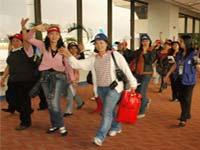OFW ‘milking cow’ scheme dropped

A proposal requiring departing overseas Filipino workers (OFWs) to pay $50 as contribution to the Emergency Repatriation Fund has been withdrawn after many OFWs felt the Philippines was treating them as a “milking cow”.
Philippine lawmaker Maria Theresa Bonoan-David, who is the principal author of the controversial House Bill (HB) 6195 that, if passed, will compel OFWs to shell out $50 for the Emergency Repatriation Fund for distressed OFWs, withdrew it in a letter addressed to the Philippine Congress. The letter was released to the media over the weekend.
This development came a little over a week after OFWs slammed the proposal in social media sites and signed various online petitions against the bill saying OFWs are not “milking cows”. There are around 10 million OFWs worldwide, of which more than 600,000 live and work in the UAE.
“This ‘shock-and-awe’ type of legislation led to a spontaneous outpouring of ‘dislike’ to put it mildly, for her proposal. It became a catalyst for passionate interaction and the coming together of OFWs from various locations all decrying the attempt to once again force them via legislation to shell out more money as OFWs,” Susan Ople, president of the Blas F. Ople Policy Centre, a migrant advocacy group in Manila that campaigned against the bill, told Gulf News.
One thing became clear from last week’s turn of events—OFWs have started to get involved in the discussion of social issues affecting them.
“What has happened is that even the ordinary OFWs, whether they have an organisation or not, are becoming more aware of the need to speak for their rights,” Yuri Cipriano, chairperson of Sulong OFW (Go Forward OFW), a migrant advocacy group, told Gulf News.
“They are now reacting to social issues which is a good sign because only migrant advocacy groups campaigned against these issues in the past,” Cipriano added.
The experience, however, should serve as an eye-opener for the country’s leaders.
“There is a lesson to be learned from this incident. Our leaders should use technology to interface with the OFW constituency, rather than second-guess from a distance what our overseas workers truly want or need,” Ople said.
Ople suggested that instead of just putting the discourse on the repatriation fund, the government should do a review of the entire overseas employment programme.
Leave a comment






